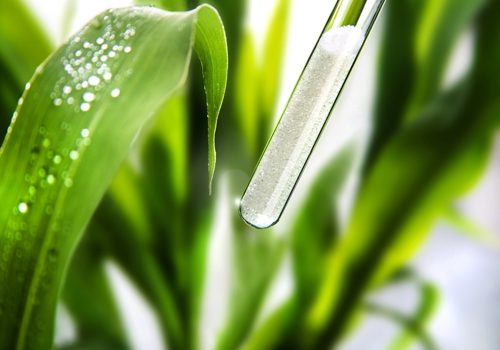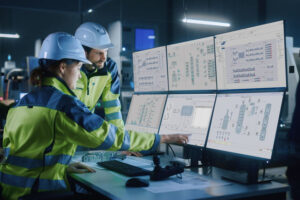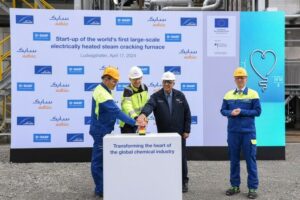The chemical industry can help reduce global CO2 emissions in two ways: first, by working to transform its own processes in order to achieve net-zero production, second, by supplying customers with innovations and technologies that help reduce the CO2 emissions generated in other industries. These two dimensions of a net-zero carbon footprint apply to Wacker as well: The company is working to lower its own CO2 footprint, while, at the same time, products help its customers to bring solutions to market that protect the climate and conserve resources.
Wackers’s targets for 2030
Wacker has set concrete targets that address the first dimension: the centerpiece here is a 50 % reduction in absolute greenhouse gas emissions by 2030 (relative to 2020). Wacker is adopting a number of specific projects and initiatives to achieve that.
In one example, the company is currently working on concepts that will enable the Holla site in Norway to replace the coal that it currently uses for producing silicon metal with biochar obtained by sustainable means. Other options available to the company to achieve even more sustainable silicon-metal manufacturing processes include the increased use of hydroelectric and wind power, as well as employing carbon capture, storage (CCS) and utilisation (CCU).
Silicon metal is a key raw material for producing silicones and for polysilicon, which is used to make solar cells and semiconductor devices. The quantities produced in Holla cover roughly a third of Wacker’s annual demand.
Using CO2 as raw material
Other Wacker projects are concerned with the value-adding potential of using unavoidable CO2 as a raw material for chemical products. For instance, Wacker is planning to build a 20 MW electrolysis plant –known as Rhyme Bavaria –at its Burghausen site. This plant is intended to use renewable electricity to produce hydrogen, which, together with CO2 from existing production processes, is then converted into methanol in a synthesis plant. The expected capacity of the synthesis plant is 15,000 t/a. Feasibility studies on comparable projects at other sites are underway. Hydrogen and methanol are both key starting materials for chemical products such as silicones.
Striving for a circular economy to achieve net zero in 2045
In a second step, Wacker intends to make its production completely carbon neutral by 2045. In order to achieve that goal, the company has launched an array of additional projects that focus on its products’ full life cycle. Renewable raw materials, for example, are to be used more intensively going forward. The company has also initiated projects for recycling packaging materials, with the aim of establishing a functioning, CO2-neutral circular economy. By joining Race to Zero, the UN’s carbon neutrality initiative, Wacker has made a voluntary commitment to the 1.5-degree target, pledging to issue transparent progress reports on its path to net zero.
Enable customers to reduce CO2
In addition to the efforts that Wacker is undertaking to achieve a net-zero business, the chemical group is also helping other industries as they move toward net zero. Many products allow customers to reduce CO2 or use their resources more efficiently, for instance. These products already make up over two-thirds of the Wacker portfolio. Many of their applications are used in industries that account for three-quarters of global emissions –starting with the energy sector and including mobility, construction and agriculture.







